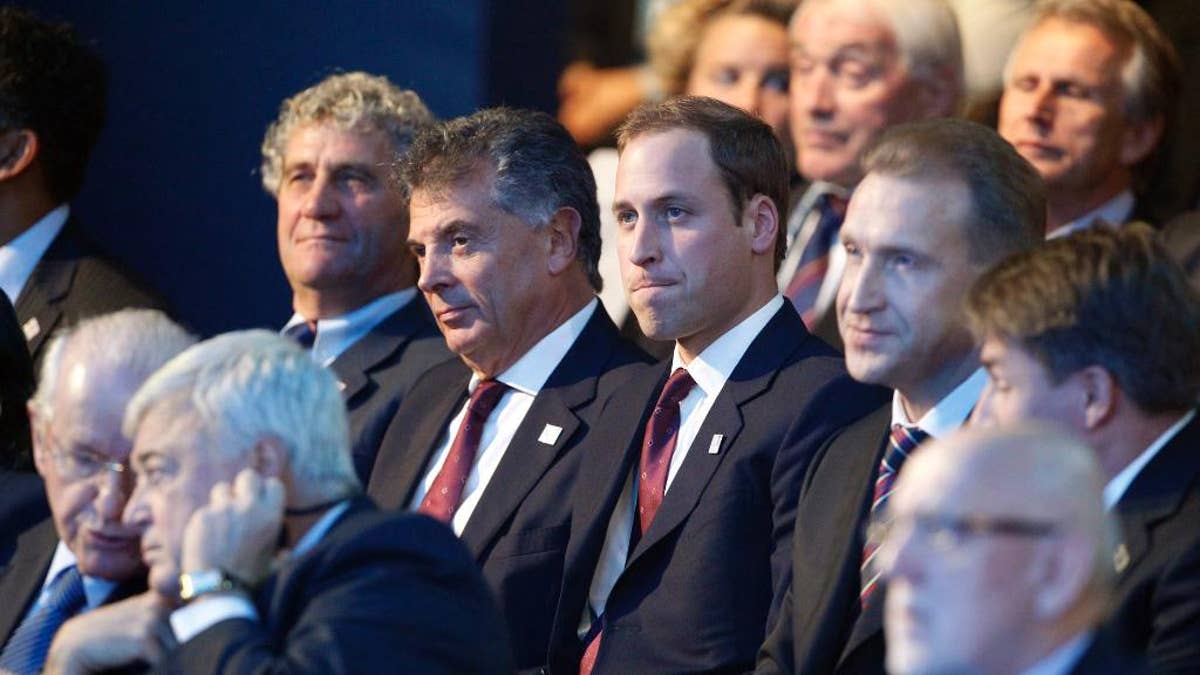
FILE - In this Thursday, Dec. 2, 2010 file photo Britain's Prince William, center, and the delegation of the England bid react after Russia was announced as host for 2018 during the FIFA 2018 and 2022 World Cup Bid Announcement in Zurich, Switzerland. FIFA has cleared Russia and Qatar of any wrongdoing in their winning bids for the next two World Cups. (AP Photo/Keystone/Patrick B. Kraemer, File) (The Associated Press)
LONDON – England received stinging criticism from FIFA over its bid team's conduct in the 2018 World Cup contest in a corruption report that accused it of "damaging the image" of world football.
FIFA ethics judge Joachim Eckert found "potentially problematic facts and circumstances" surrounding England's bid, specifically criticizing the bid team's attempts to woo disgraced former FIFA vice president Jack Warner.
The bid teams of Australia, Japan and South Korea were also rebuked for their conduct in bidding for the 2022 World Cup.
Eckert ruled none of the actions of the bidding nations affected the integrity of the vote, made in 2010, which gave the 2018 tournament to Russia and the 2022 tournament to Qatar. However, he said he believes "serious violations of bidding rules" occurred and that disciplinary proceedings could be launched relating to England's bid.
"We do not accept any criticism regarding the integrity of England's bid or any of the individuals involved," the English FA said in response to the report. "We conducted a transparent bid and, as the report demonstrates with its reference to the England bid team's 'full and valuable cooperation,' willingly complied with the investigation.
"We maintain that transparency and cooperation around this entire process from all involved is crucial to its credibility."
England, which included David Beckham and FA president Prince William as ambassadors in its bid team, received only two of the 22 votes in the 2018 election.
Eckert's report rebuked England for its ties to Warner, the former head of CONCACAF, the North American soccer confederation. England has been a vocal critic of Warner, FIFA and FIFA President Sepp Blatter since its humiliating vote result.
Eckert accused Warner, who resigned from FIFA in 2011 to avoid a corruption investigation, of "showering the England 2018 bid team with inappropriate requests" to gain his vote.
Eckert said in his 42-page report that Warner's expectation that bidders would accommodate his wishes was in "apparent violation of bidding rules" and FIFA's ethics code.
"England 2018's response showed a willingness, time and again, to meet such expectation, thereby damaging the image of FIFA and the bidding process," the German judge added, saying ethics proceedings could be launched against "specific individuals."
England's bid team was very public in its attempts to gain Warner's support, embarking on high-profile trips to Trinidad and Tobago. But having reviewed evidence from ethics prosecutor Michael Garcia, Eckert criticized England for agreeing to Warner's request to pay $55,000 to sponsor a Caribbean Football Union dinner in 2010, which "damaged the integrity of the bidding process."
Eckert found the damage was of a "limited extent" as was also the case when England provided "substantial assistance" for the Trinidad and Tobago under-20 team to train in Britain in 2009, and appeared willing to provide "benefits" to a Warner-owned club.
England found a job in Britain for a "person of interest" to Warner, Eckert said, giving the appearance "it sought to confer a personal benefit" to influence his vote.
On some of the other bids, Eckert said:
— Australia (2022): There were attempts to divert Australian government funding set aside for African projects to countries with ties to FIFA voters. Two Australia consultants "violated the bidding and ethics rules."
— Japan (2022): The bid team distributed several different gifts, worth from $700 to $2,000, to senior FIFA officials and their wives in 2010.
— South Korea (2022): A proposal of Dr. Mong-Joon Chung, a FIFA vice president and honorary president of the Korean Football Association, to establish a global football development fund gave the appearance of "a conflict or an offer of benefits" to influence FIFA voters.
— United States (2022): There was "no major problematic conduct" by U.S. officials, although discrepancies were found in the documentation submitted.
___
Rob Harris can be followed at www.twitter.com/RobHarris
